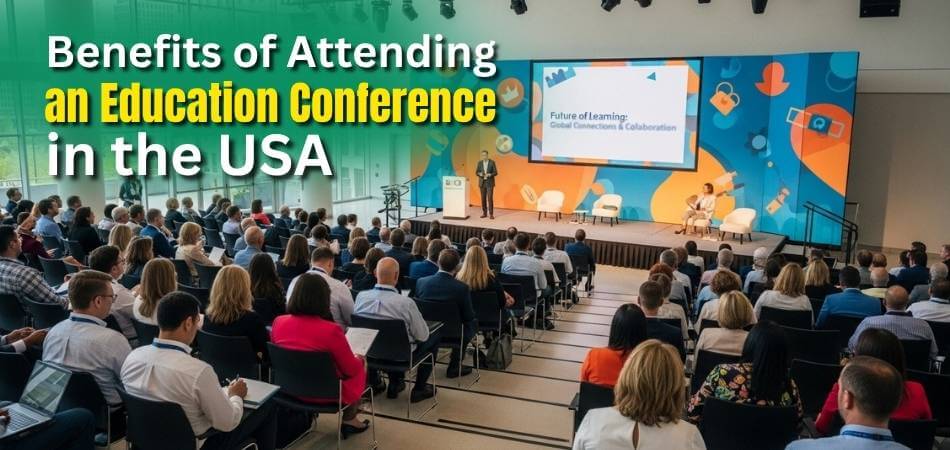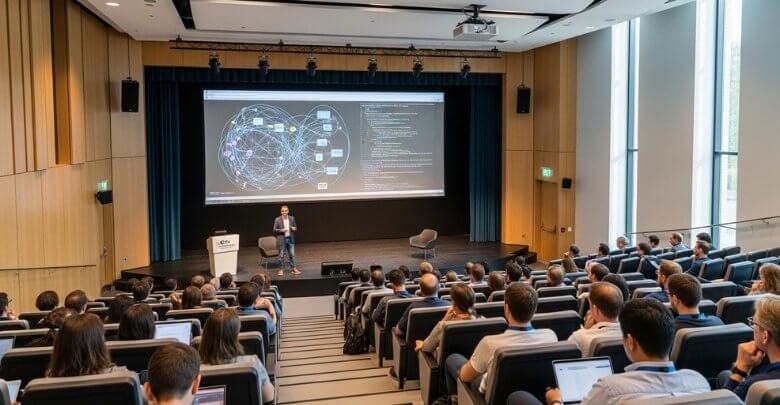You can learn a lot and grow a lot by attending a US education conference. These events bring together teachers, students, and experts who share fresh ideas and new tools. They create a friendly space where you can connect with others, exchange knowledge, and get inspired. Many people also use these conferences to take the next step in their careers.
So, what are the benefits of attending an education conference in the USA?
Attending an education conference in the USA helps you learn new teaching ideas, meet experts, and grow your career. You can share knowledge, get inspired, and improve your skills. These events also offer certificates, job chances, and new tools for better learning. Students and teachers can both benefit from these conferences.
Keep reading to learn more about how these conferences can make a big difference.
Benefits of Attending an Education Conference in the USA
Education conferences in the USA bring teachers, students, and experts together in one place. They create chances for learning, sharing, and growth. Attendees explore new ideas, discover fresh tools, and connect with others. These events help people improve skills, gain knowledge, and grow their careers in many practical ways. Here are more benefits of attending.
Professional Development and Knowledge Sharing
Education conferences give teachers new ideas, tools, and strategies for classrooms. They highlight the latest research and teaching methods. Learning from experts helps teachers stay updated and confident. Sharing knowledge also encourages creativity and better teaching results.
Workshops make learning more practical by showing real classroom solutions. Attendees explore ideas they can apply right away. These events also inspire reflection on personal teaching styles. Together, they build stronger professional skills that last beyond the event.
Networking Opportunities
Conferences bring together teachers, researchers, and professionals from many places. Meeting people creates helpful connections that last for years. These relationships often lead to projects, mentorship, or even job opportunities. Networking also makes conferences more enjoyable and meaningful.
Friendly conversations during breaks often spark valuable discussions. Sharing ideas creates trust and understanding among peers. Many teachers also find mentors who guide their careers. Networking builds communities that keep supporting one another after the event.
Exposure to Innovative Practices and Perspectives
Attending a conference in USA introduces people to fresh perspectives and new tools. It shows how other schools solve common problems. Exposure to global teaching practices encourages open thinking and creativity. Teachers return with ideas they can adapt in their classrooms.
Hearing different viewpoints improves problem-solving skills. It also builds appreciation for unique teaching approaches. These experiences help teachers shape better strategies for students. Conferences open doors to new ways of thinking about education.
Inspiration and Motivation
Hearing inspiring talks and success stories renews passion for education. These moments remind teachers why they love teaching. Stories of dedication encourage others to improve their work. This inspiration often turns into real action back in classrooms.
Motivation from conferences helps teachers try new methods. They feel ready to face challenges with energy. Positive experiences build confidence and a stronger commitment. Conferences leave lasting motivation for growth and success.
Career Advancement and Credentials
Many conferences offer certificates for attending sessions. These certificates make resumes stronger and show ongoing growth. Employers value them when looking for leaders. Certificates also prove the knowledge gained during the event.
Some events connect attendees with recruiters and organizations. These meetings may lead to new jobs or promotions. Presenting research improves reputation and confidence. Career growth becomes possible through conference participation.
Access to Resources and Collaboration
Conferences often include displays of tools and teaching resources. Teachers test apps, materials, and methods that improve learning. These resources add value to classrooms and keep teaching up to date. Access to tools helps teachers adapt faster.
Collaboration also grows during workshops and group sessions. Teachers form teams to work on projects or research. These partnerships continue after the event. Shared resources and teamwork improve education for everyone.
Benefits for Students and Early Career Professionals
Students and new teachers also gain a lot from conferences. They explore career interests and meet role models. Presenting their work builds confidence and speaking skills. Exposure to experts guides them toward clearer goals.
Conferences help young professionals build teamwork and problem-solving skills. They also connect with supportive mentors and peers. Access to resources supports their growth. These experiences prepare them for strong future careers.
Who Gets the Most Benefit From Attending an Education Conference?
Education conferences are not just events; they are valuable learning opportunities. Different groups gain unique advantages through participation. Let’s explore who benefits the most from these gatherings.
Teachers
Teachers gain the newest ideas and practical tools for classrooms. Conferences expose them to inspiring speakers, resources, and training opportunities. They return with stronger skills, more confidence, and clearer direction. Learning directly from experts helps them create better teaching strategies and improved outcomes for their students.
Students
Students attending conferences build confidence by presenting projects and meeting role models. Exposure to different career paths shapes their ambitions. They also sharpen communication skills and critical thinking through active involvement. Attending these events helps them clarify academic goals and future professional plans effectively.
School Leaders
Principals and administrators gain broad perspectives on school management and curriculum development. They discover policies that work across institutions worldwide. Meeting other leaders opens doors for strong collaborations. Education conferences help them develop vision, build stronger teams, and make schools more effective.
Early-Career Professionals
Young professionals discover direction by interacting with mentors and senior educators. These meetings encourage confidence and provide career inspiration. Conferences also sharpen decision-making skills through participation in discussions and workshops. Early involvement creates lasting habits of growth and professional development.
Researchers
Researchers gain visibility by presenting their findings to wide audiences. These interactions build collaborations for future studies and publications. Exposure to real-world feedback refines their work meaningfully. Education conferences also connect them with institutions willing to support research through partnerships.
How to Choose the Right US Education Conference for Achieving Goals?
Attending an education conference is an investment in personal and professional growth. Choosing the right one requires careful thought. The following steps will guide you to select conferences that align with your educational and career goals.
Step 1: Define Your Purpose
- Identify what you want to achieve before registering. Clear goals ensure the event contributes directly toward your progress.
- Decide whether you seek inspiration, practical skills, or networking. Knowing your needs helps narrow down suitable conference choices.
Step 2: Research Conference Options
- Explore events that match your teaching level and subject area. Careful selection avoids time wasted on irrelevant sessions.
- Look into the reputation of organizers and past participants. Reliable events often feature strong speakers and practical workshops.
Step 3: Evaluate Session Topics
- Review the schedule carefully and ensure topics align with your learning requirements. Attending unrelated sessions may waste valuable time.
- Prioritize programs offering interactive activities and case studies. Such formats provide deeper insights and practical solutions for classrooms.
Step 4: Consider Location and Accessibility
- Think about whether travel suits your schedule and budget. Accessibility impacts your comfort and overall conference learning experience.
- For international participation, ensure you prepare travel requirements in advance. Many attendees must get a USA conference visa as a blogger or educator.
Step 5: Assess Networking Opportunities
- Conferences offering small group discussions help create meaningful professional connections. Engaging conversations often lead to long-term collaborations.
- Look for scheduled networking breaks and informal meetups. These moments usually provide chances to exchange ideas and form partnerships.
Step 6: Check Value for Money
- Compare registration costs with benefits such as resources, certificates, and learning opportunities. Balance ensures maximum gain from your investment.
- Consider sponsorships or institutional funding options. Financial support can make attending more accessible without straining personal budgets.
Step 7: Review Feedback and Testimonials
- Read reviews from past participants to measure event effectiveness. Honest feedback highlights strengths and potential areas of concern.
- Testimonials often reveal hidden aspects such as atmosphere, management, or resource quality. These insights help set realistic expectations.
How to Network Effectively at an Education Conference?
Meeting new people at a big event can sometimes feel a little tricky and confusing. You may feel unsure about starting conversations or introducing yourself. But these moments are important because they often lead to helpful friendships and learning. Knowing some simple steps can make networking easier and more comfortable.
Start Small
It’s okay to begin with short chats instead of long talks. A smile or a simple greeting works well. Small conversations often lead to stronger discussions later on. Don’t pressure yourself to impress right away.
Be Curious
Ask people about their work, their interests, or why they came to the conference. Listening closely shows respect and interest. Most people enjoy talking about their experiences. Curiosity makes conversations natural and easy to continue.
Share Your Thoughts
Conferences are not just for listening. Share your own ideas or questions during breaks or group discussions. Speaking up shows confidence and interest. People remember you more when you add your own thoughts.
Use Break Times
Breaks are the best time to meet new people casually. Grab a coffee and start chatting nearby. Small talk during these moments feels easier and less serious. Many friendships begin during casual break conversations.
Connect Online
Most conferences have groups on social media or apps. Use these to keep in touch with new people. Sending a short message later shows you care about staying connected. Online connections often turn into real-life opportunities.
Stay Positive
A cheerful and open attitude makes networking easier. People naturally enjoy talking with someone who seems kind and friendly. Smiling and listening carefully build trust. A positive mood helps others feel comfortable around you.
Tips to Prepare for Your Conference Trip
Getting ready for a conference trip can feel exciting but also a little stressful. You may wonder about what to take or how to plan your time well. A good start makes the whole trip smoother and more fun. Let’s look at simple tips that will help you feel prepared and confident.
Plan Ahead
Make a list of everything you need before the trip. Writing things down keeps you from forgetting important items. Check travel details like tickets and dates early. Planning ahead saves time and avoids last-minute stress.
Pack Smart
Bring clothes that are comfortable but also neat enough for conference days. Carry a small bag for essentials like notes or pens. Avoid stuffing your luggage with too many extras. Keeping things light makes travel easier and more enjoyable.
Know the Schedule
Look at the conference program before you leave. Mark sessions that seem useful or interesting to you. Having a clear plan helps you focus. You’ll also avoid missing events that matter the most.
Arrange Travel
Book your transport early to get better prices and more choices. Double-check the time of departure and arrival. Keep important papers like ID and tickets in a safe spot. Good travel plans make your trip stress-free.
Stay Organized
Keep all conference details in one place, like a notebook or a phone folder. This makes it easier to find information quickly. Note down hotel details, contact numbers, and session times. Staying organized keeps you calm during busy days.
Important Documents
Carry extra copies of your ID, tickets, and conference registration. It’s always better to have a backup just in case. If you need to apply for conference in USA, start the process early. Proper documents make your entry smooth and hassle-free.
Health and Rest
Drink enough water and get proper sleep before your trip. Feeling tired makes it hard to enjoy the event. Pack any medicines you might need. Staying healthy ensures you make the most of your time.
Frequently Asked Questions About the Benefits of Attending an Education Conference in the USA
Education conferences are powerful events where students, teachers, and professionals come together. Many people wonder what extra benefits these events bring. Below are common questions and clear answers to help you understand their true value.
How Do Conferences Improve Communication Skills?
Conferences often encourage open discussions, Q&A sessions, and group activities. By participating, attendees practice expressing ideas clearly and listening carefully. These skills grow stronger with every interaction. Improved communication benefits both professional success and personal growth in education.
Can Attending Conferences Help With Confidence Building?
Yes, sharing ideas, asking questions, or even presenting builds confidence in participants. Confidence grows when feedback is encouraging and supportive. Being surrounded by like-minded learners creates a safe space. This makes people feel stronger in their skills and knowledge.
Do Education Conferences Offer Global Perspectives?
Education conferences often bring participants from different countries. This variety creates a chance to hear how schools work worldwide. Learning about international practices encourages new thinking. Attendees return with fresh approaches that can make classrooms more inclusive and effective.
How Do Conferences Inspire Lifelong Learning?
These events spark curiosity by introducing new research, teaching methods, and ideas. Inspiration encourages participants to keep learning beyond the event. Continuous learning strengthens professional growth and personal development. This long-term habit benefits both educators and students alike.
Can Students Benefit Directly From Conferences?
Absolutely, students gain new insights, presentation experience, and career guidance. Meeting role models helps them see real opportunities. Learning directly from experts makes knowledge more meaningful. Students leave motivated to pursue higher goals and improve their academic performance.
Do Conferences Support Leadership Development?
Yes, workshops and panels often include training in leadership skills. Participants learn how to guide teams effectively. Conferences show practical ways to handle challenges in schools. These lessons prepare educators for roles that require leadership and responsibility.
How Do Conferences Encourage Creativity In Teaching?
By sharing real examples and hands-on methods, conferences unlock creative approaches to learning. Teachers learn different techniques for engaging students. Creative lessons make classrooms exciting and effective. This renewed creativity benefits both teachers and learners long after the event.
Are There Opportunities For Research Collaboration?
Many conferences provide space for researchers to connect and share ideas. Discussions often turn into real projects. Collaboration helps improve research quality and outcomes. These opportunities allow experts to work together on solutions that benefit education communities worldwide.
Concluding Thoughts
The USA is a great place to learn and grow if you attend a conference there. You get to meet new people and share your ideas. These events also give you new tools and ways to teach better. The benefits of attending an education conference in the USA include learning new things, building confidence, and finding job opportunities.
You can also get help from others and feel more ready to move forward. If you plan well and stay open to learning, the experience will be even better. A good conference can change how you think, teach, and reach your goals.








